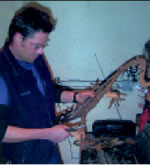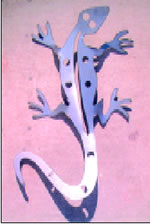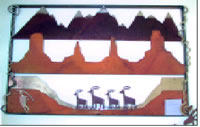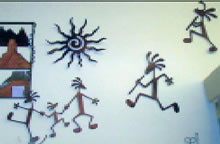|
Moab Utah artists. Moab is home to many
local artists and nationally known artists. These talented
people work in a range of mediums from visual arts through
literary to musical. Each month Moab Happenings features one
of our talented local Moab artists.
ARTIST OF THE MONTH -
February 2002
Jim Aleff: Bringing Metal to Life
by Sydney Francis
 As
I have been writing “Artist of the Month” on Jim
Aleff, one question sticks out in my mind: “what makes
his metal figures so compelling?” Is it the playful southwestern
imagery? Or the mystery of the ancient Fremont figures? Could
it be the simplicity captured in a single animated piece of
flat metal? Or is it Aleff’s inner personality emanating
from the metal work? I do not know the answer, but I suspect
it lies within the intersection of all these questions. As
I have been writing “Artist of the Month” on Jim
Aleff, one question sticks out in my mind: “what makes
his metal figures so compelling?” Is it the playful southwestern
imagery? Or the mystery of the ancient Fremont figures? Could
it be the simplicity captured in a single animated piece of
flat metal? Or is it Aleff’s inner personality emanating
from the metal work? I do not know the answer, but I suspect
it lies within the intersection of all these questions.
Aleff works professionally for Earth Studio as the lead designer
and workshop manager in charge of the production of original
designs, sculptures and products. He began metal work for
Earth Studio about five years ago teaching himself with a
plasma torch. Aleff had come to Moab with the owners of Earth
Studio from Wisconsin where he did a variety of artistic projects.
Aleff creates a range of functional and decorative metal sculptures,
including wall figures, vases, luminarias, free-standing sculptures,
picture frames, garden art, and so much more. He enjoys working
in the Earth Studio workshop because the job is creative and
stimulating and every year he finds himself exploring new
techniques, designs and projects.
 One
of the most exciting new achievements of Aleff’s sculpting
career is his 2002 Olympic sculpture found at the Moab Information
Center. Aleff responded to a “call to artists” posted
by the Moab Utah 2002 Committee by submitting a prototype
of his sculpture. Aleff’s sculpture was chosen to commemorate
the torch visiting Moab on February 4th 2002. This sculpture
represents an historic and cultural moment: Delicate Arch
epitomizes the natural wonderment of the area landscape; the
Olympic torch signifies this moment in time and the spirit
of peace, harmony and individual achievement; and the running
kokopelli expresses not only the athleticism associated with
the Olympic Games, but rather the trans-historical continuity
of life and culture in the Moab Valley. One
of the most exciting new achievements of Aleff’s sculpting
career is his 2002 Olympic sculpture found at the Moab Information
Center. Aleff responded to a “call to artists” posted
by the Moab Utah 2002 Committee by submitting a prototype
of his sculpture. Aleff’s sculpture was chosen to commemorate
the torch visiting Moab on February 4th 2002. This sculpture
represents an historic and cultural moment: Delicate Arch
epitomizes the natural wonderment of the area landscape; the
Olympic torch signifies this moment in time and the spirit
of peace, harmony and individual achievement; and the running
kokopelli expresses not only the athleticism associated with
the Olympic Games, but rather the trans-historical continuity
of life and culture in the Moab Valley.
The fun-loving kokopelli is an archetype that speaks to the
new Southwest. Kokopelli, the flute player, is widely recognized
as the manifestation of masculine fertility, spreading his
potency with his music. This particular kokopelli is Aleff’s
signature design, which he uses in different wall figures
and sculptures. Kokopelli skips with the flute, runs, plays,
and hold hands with a family of similar figures.
“Moab Man” less playful than the kokopelli figures
shows a very well known petroglyph image found in the Moab
area. “Moab Man” is the nickname for this local
Fremont figure created circa 1050-1200 AD Some archeologists
suggest that these figures are a record of spirit and power
in distinctly humanized form.
 One
of Aleff ’s primary sources of joy and inspiration is
his daughter Alie. I have seen some very playful little girls
with flowers, which simply portray the basic love a father
has for his daughter. I think some of the fun and whimsy found
in Aleff s signature kokopelli pieces holding hands or dancing
is attributed to the inspiration that Aleff finds in Alie.
Alie also has designed some metal pieces, which have been
on display and for sale at Earth Studio. One
of Aleff ’s primary sources of joy and inspiration is
his daughter Alie. I have seen some very playful little girls
with flowers, which simply portray the basic love a father
has for his daughter. I think some of the fun and whimsy found
in Aleff s signature kokopelli pieces holding hands or dancing
is attributed to the inspiration that Aleff finds in Alie.
Alie also has designed some metal pieces, which have been
on display and for sale at Earth Studio.
Aleff has some more complex pieces like his landscape found
at Dave’s Corner Market above the espresso machine. The
landscape has three layers framed into an outer border. The
top layer represents the La Sal mountains; the next layer
is of the rock formations that characterize the area; and
then the bottom layer is the river valley with petroglyph
cutouts of bighorn sheep. A kokopelli figure plays his flute
in the left-hand corner. And long spiraling lines found on
nearby petroglyph sites frame the right and left sides of
the scene. Aleff uses different metal textures and colors
to express the depth of the landscape and also its varying
geological qualities. The landscape is both simple and abstract
like the petro-figures it utilizes.
 Jim,
himself, was friendly but not arrogant. He came off very positive
and constructive, while maintaining an inner calm and modesty.
Although, Aleff is a professional artist and designer with
a public monument and several gallery openings under his belt,
I do not think he would include “artist” as the
primary definition of his identity. He did not grow up with
dreams of being an artist, but rather he followed a series
of his talents in design and craftsmanship to very enriching
and creative professional artistic career. Although, he is
truly an artist in his ability to capture and express the
mystery of human culture in his petroglyphic figures. Jim,
himself, was friendly but not arrogant. He came off very positive
and constructive, while maintaining an inner calm and modesty.
Although, Aleff is a professional artist and designer with
a public monument and several gallery openings under his belt,
I do not think he would include “artist” as the
primary definition of his identity. He did not grow up with
dreams of being an artist, but rather he followed a series
of his talents in design and craftsmanship to very enriching
and creative professional artistic career. Although, he is
truly an artist in his ability to capture and express the
mystery of human culture in his petroglyphic figures.
I found Aleff to be a bit of an enigma. He expresses such
a range of design perception from the fun and simple to the
complex and mysterious. He did not offer me many clues to
piecing the puzzle together, as he was modest and seemingly
surprised by my interest in his work. But perhaps it is not
necessary to understand in order to appreciate the timeless
mystery of the petroglyph archetypes or the childlike joy
of a father-daughter relationship expressed in playful families
of kokopellis holding hands.
|

 One
of the most exciting new achievements of Aleff’s sculpting
career is his 2002 Olympic sculpture found at the Moab Information
Center. Aleff responded to a “call to artists” posted
by the Moab Utah 2002 Committee by submitting a prototype
of his sculpture. Aleff’s sculpture was chosen to commemorate
the torch visiting Moab on February 4th 2002. This sculpture
represents an historic and cultural moment: Delicate Arch
epitomizes the natural wonderment of the area landscape; the
Olympic torch signifies this moment in time and the spirit
of peace, harmony and individual achievement; and the running
kokopelli expresses not only the athleticism associated with
the Olympic Games, but rather the trans-historical continuity
of life and culture in the Moab Valley.
One
of the most exciting new achievements of Aleff’s sculpting
career is his 2002 Olympic sculpture found at the Moab Information
Center. Aleff responded to a “call to artists” posted
by the Moab Utah 2002 Committee by submitting a prototype
of his sculpture. Aleff’s sculpture was chosen to commemorate
the torch visiting Moab on February 4th 2002. This sculpture
represents an historic and cultural moment: Delicate Arch
epitomizes the natural wonderment of the area landscape; the
Olympic torch signifies this moment in time and the spirit
of peace, harmony and individual achievement; and the running
kokopelli expresses not only the athleticism associated with
the Olympic Games, but rather the trans-historical continuity
of life and culture in the Moab Valley. One
of Aleff ’s primary sources of joy and inspiration is
his daughter Alie. I have seen some very playful little girls
with flowers, which simply portray the basic love a father
has for his daughter. I think some of the fun and whimsy found
in Aleff s signature kokopelli pieces holding hands or dancing
is attributed to the inspiration that Aleff finds in Alie.
Alie also has designed some metal pieces, which have been
on display and for sale at Earth Studio.
One
of Aleff ’s primary sources of joy and inspiration is
his daughter Alie. I have seen some very playful little girls
with flowers, which simply portray the basic love a father
has for his daughter. I think some of the fun and whimsy found
in Aleff s signature kokopelli pieces holding hands or dancing
is attributed to the inspiration that Aleff finds in Alie.
Alie also has designed some metal pieces, which have been
on display and for sale at Earth Studio. Jim,
himself, was friendly but not arrogant. He came off very positive
and constructive, while maintaining an inner calm and modesty.
Although, Aleff is a professional artist and designer with
a public monument and several gallery openings under his belt,
I do not think he would include “artist” as the
primary definition of his identity. He did not grow up with
dreams of being an artist, but rather he followed a series
of his talents in design and craftsmanship to very enriching
and creative professional artistic career. Although, he is
truly an artist in his ability to capture and express the
mystery of human culture in his petroglyphic figures.
Jim,
himself, was friendly but not arrogant. He came off very positive
and constructive, while maintaining an inner calm and modesty.
Although, Aleff is a professional artist and designer with
a public monument and several gallery openings under his belt,
I do not think he would include “artist” as the
primary definition of his identity. He did not grow up with
dreams of being an artist, but rather he followed a series
of his talents in design and craftsmanship to very enriching
and creative professional artistic career. Although, he is
truly an artist in his ability to capture and express the
mystery of human culture in his petroglyphic figures.